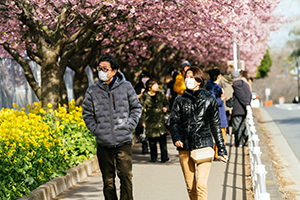
Posted 11 March 2020, the 9th anniversary of the Great East Japan Earthquake.
Unimaginable setbacks to Japan nine years ago from the triple disasters of the earthquake, tsunami, and Fukushima emergency were used to pioneer new approaches to regional development and integrated reconstruction to build back better, safer, and greener.
In the aftermath of the unprecedented Asian financial crisis, the region set up its own monetary safety net, allowing GDP to rebound and recover past its pre-crisis levels.
And going back even further to the pandemic of the late 1960s, the GDP of Hong Kong, China tripled within only 5 years from the end of the outbreak, from $3.19 billion in 1969 to $9.4 billion in 1974.
While country comparisons and past experiences are not predictive of future performance, one constant lesson is Asia’s historical resilience and ability to quickly work itself back from natural and financial shocks to regain its leadership.
Asia’s treatment experiences and therapeutic trials can lead the way
As we enter the springtime promise of early cherry blossom flowers, the countries of North Asia have become pathfinders in the struggle to prepare for, slow down, and fight back from the COVID-19 global emergency.
In the coming weeks, many important scientific discoveries are expected to be made and treatment experiences shared from metasurvey findings and ongoing trials in Singapore and other cities that have achieved good results at containment and treating their affected patients.
Less certain are the fiscal stimuli or central banking policies that will be most appropriate for minimizing the effects of small business losses and factory suspensions; encouraging returns in demand (at the right time) for crowd activities, including retail and leisure; and quickly fixing disrupted supply chains, production networks, and eventually reconnecting trade, tourism, and student exchanges.
However, commentators are already pointing out areas for improvement in the medium to long term that far-sighted innovators and philanthropists could begin to take on.
Hospital ships, mobile testing, pop-up clinics
In the era of nanomaterials, isn’t it about time we had reusable and omnipresent face masks that can filter particulate and contaminant matter more effectively? Seasonal mask-wearing and the use of scarves are part of the culture and a widespread practice in many Asian countries already, but they are still being short-changed by coarse, paper products that are not fit for use in both directions.
Four decades after the discovery of how Legionnaire’s disease could contaminate air conditioning, wouldn’t it build confidence if air purifiers in our homes, conveyances, and office buildings were installed and maintained to the cleanest standards achievable? Also, we’ve known for a while that public toilets need to become a lot smarter and more hygienic, with non-touch sensors that flush while the cover is down to avoid the spread of contaminants.
In the middle of the 20th century, mobile x-ray vans would regularly visit communities in the developed world to scan the general public immediately for unsuspected tuberculosis shadows (infiltrates) on their lungs. How long would it take to convert mobile blood donation or cancer detection buses to begin offering these and other types of outreach testing services through specialist or pop-up clinics to local communities once again?
And instead of another capital ship or submarine, wouldn’t it be enlightened self-interest if more developed countries could consider building at least one civilian-use hospital ship, with extra intensive-care beds that could come to the aid of areas stricken with natural disasters or health emergencies and with swamped or inadequate medical infrastructure. Between crises they could also make regular port visits to least developed regions for lifesaving or specialist surgeries (e.g., for cataracts). Just imagine the humanitarian goodwill such ships could engender.
Asia wrote the book on recovery from shocks
Asia has many playbooks for recovery from every conceivable shock and is endowed with brilliant scientists, economists, entrepreneurs, and philanthropists brimming with ideas capable of overcoming the current threat to the world economy. Now is their time to take stock and head off the next global health crisis.
_____
References:
Asian Development Bank (ADB). 2020. Asia’s Journey to Prosperity: Policy, Market, and Technology Over 50 Years. Manila: ADB.
ADB. 2020. Responding to the Novel Coronavirus Crisis – 13 Lessons from Evaluation. 13 February. Manila: ADB.
ADB. 2020. The Economic Impact of the COVID-19 Outbreak on Developing Asia. ADB Briefs No. 128. Manila: ADB.
Akimoto, D. 2020. Japan Should – Like Other Countries – Build and Operate Hospital Ships. The Interpreter. 13 February. Lowy Institute.
Carter, W. N. 2008. Disaster Management: A Disaster Manager’s Handbook. Manila: Asian Development Bank.
Channel News Asia. 2020. Coronavirus Lingers in Rooms and Toilets, but Disinfectants Kill It: Singapore Study. 5 March.
Channel News Asia. 2020. Television interview with ADBI Dean Naoyuki Yoshino on the Economic Impacts of the Coronavirus in Japan and Asia. Asia First. 11 March.
Counahan, M., S. Khetrapal, J. Parry, G. Servais, and S. Roth. 2018. Investing in Health Security for Sustainable Development in Asia and the Pacific: Managing Health Threats Through Regional and Intersectoral Cooperation. Asian Development Bank.
G20. 2020. Communique. Finance Ministers & Central Bank Governors Meeting 22-23 February 2020, Riyadh, Saudi Arabia.
Huiyao, Y. 2020. Working together to Defeat the Virus. US-Asia Focus. 5 March.
Kelkar, V. 2018. What Can Countries in Asia Learn from the Republic of Korea and Malaysia about Sanitation and Its Economic Impacts? Asia Pathways blog. 19 January.
McKibbin, W. J., and A. A. Sidorenko. 2006. Global Macroeconomic Consequences of Pandemic Influenza. ANU Centre for Applied Macroeconomic Analysis.
Shirai, S. 2020. Policy Responses to Covid-19. 28 February. Central Banking.com
Tjandraningsih, C. T. 2020. ADB President Says Coronavirus Impacts May Eclipse SARS Crisis. Kyodo News. 5 March.
USAID and Challenge TB. Mobile Care for TB Screening and Diagnosis: A How-to Guide.
World Bank. 2020. National Accounts Data. (Accessed 9 March 2020.)







Comments are closed.